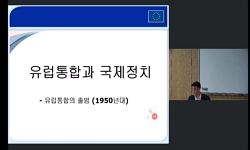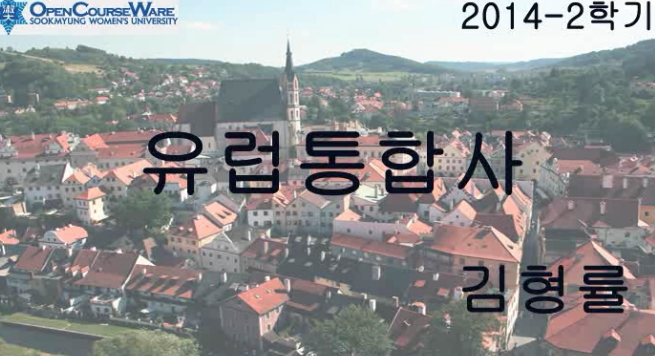This article examines Husserl's thoughts on Europe, focusing on his later works, The Crisis of European Sciences and Transcendental Phenomenology including his lecture in Vienna, “The Crisis and Philosophy of European Humanity” and some other appe...
http://chineseinput.net/에서 pinyin(병음)방식으로 중국어를 변환할 수 있습니다.
변환된 중국어를 복사하여 사용하시면 됩니다.
- 中文 을 입력하시려면 zhongwen을 입력하시고 space를누르시면됩니다.
- 北京 을 입력하시려면 beijing을 입력하시고 space를 누르시면 됩니다.

유럽에 대한 후설의 생각과 그에 대한 비판적 검토 = A Critical Examination of Husserl’s Thoughts on Europe Focusing on Crisis
한글로보기부가정보
다국어 초록 (Multilingual Abstract)
Husserl attempts to respond to the European crisis by presenting a transcendental phenomenology which is true to the idea of science(or to Wissenschaftlichkeit). It is because he thinks that there is a crisis of science, a crisis of rationality at the root of European crisis. In these thoughts, lies his understanding on the role of science, or philosophy in the formation of humanity and its environment(Umwelt). Therefore this article deals with the corelation between humanity(Menschentum) and science, or between science and human existence, specifically European existence in detail.
Husserl thinks that the philosophy which emerged in ancient Greece gave birth to a new humanity and culture. So, in order to overcome the crisis of humanity that exists at the root of the crisis of European culture, he analyzes the path of deterioration of the idea of science and presents a transcendental phenomenology which is true to that idea as an alternative. However, we can see that in that process, Husserl gives a privileged position to Europe.
To overcome this Eurocentricity, various efforts would be required. First of all, it is necessary for Europe (or, European philosophers) to actively accept various criticism raised inside and outside Europe. Because in responding to criticism, Europe will open a wider horizon for desirable intercultural relations by discovering resources to deconstruct the idea of privileged Europe that exists within Husserl's philosophy, or by humbly acknowledging the lack of such resources.
This article ends with proposing that Both Europe and non-Europe need a consciousness and attitude that regards themselves respectively as a member of one and only world, as a limited horizon, not a universal one, which is required to project (De)Europeanization that both European and non-European hope for.
This article examines Husserl's thoughts on Europe, focusing on his later works, The Crisis of European Sciences and Transcendental Phenomenology including his lecture in Vienna, “The Crisis and Philosophy of European Humanity” and some other appendixes. There Husserl, faced with a crisis in European humanity, asked what Europe was and what it should be. Therefore, in order to analyze and examine Husserl's thoughts on Europe, it is necessary to analyze his views on the origin and nature of European crisis.
Husserl attempts to respond to the European crisis by presenting a transcendental phenomenology which is true to the idea of science(or to Wissenschaftlichkeit). It is because he thinks that there is a crisis of science, a crisis of rationality at the root of European crisis. In these thoughts, lies his understanding on the role of science, or philosophy in the formation of humanity and its environment(Umwelt). Therefore this article deals with the corelation between humanity(Menschentum) and science, or between science and human existence, specifically European existence in detail.
Husserl thinks that the philosophy which emerged in ancient Greece gave birth to a new humanity and culture. So, in order to overcome the crisis of humanity that exists at the root of the crisis of European culture, he analyzes the path of deterioration of the idea of science and presents a transcendental phenomenology which is true to that idea as an alternative. However, we can see that in that process, Husserl gives a privileged position to Europe.
To overcome this Eurocentricity, various efforts would be required. First of all, it is necessary for Europe (or, European philosophers) to actively accept various criticism raised inside and outside Europe. Because in responding to criticism, Europe will open a wider horizon for desirable intercultural relations by discovering resources to deconstruct the idea of privileged Europe that exists within Husserl's philosophy, or by humbly acknowledging the lack of such resources.
This article ends with proposing that Both Europe and non-Europe need a consciousness and attitude that regards themselves respectively as a member of one and only world, as a limited horizon, not a universal one, which is required to project (De)Europeanization that both European and non-European hope for.
국문 초록 (Abstract)
후설은 유럽 위기의 근저에 학문의 위기, 합리성의 위기가 있다고 생각하여, 그에 대해 선험적 현상학으로 대응하려 한다. 여기에는 인간성과 그 환경세계(Umwelt)의 형성에서 학문, 혹은 철학이 수행하는 역할에 대한 후설의 생각이 자리하고 있다. 따라서 이 글은 인간성과 학문의 상관성에 대해, 혹은 학문과 인간 실존, 유럽인의 실존의 결합에 대해 비교적 상세하게 다룬다.
후설은 고대 그리스에서 등장한 철학이 새로운 인간성과 문화를 탄생시켰다고 본다. 그렇기에 유럽 문화의 위기 근저에 존재하는 인간성의 위기를 극복하기 위해 학문성의 변질 경로를 분석하고, 본래의 이념에 충실한 학문인 선험적 현상학을 제시하는 것이다. 그런데 이러한 과정에서 후설이 유럽에 특권적 위상을 부여하는 것을 확인할 수 있다.
이러한 유럽중심성을 극복하기 위해서는 다양한 노력이 필요할 것이다. 무엇보다 유럽 안팎에서 제기되는 다양한 비판에 유럽(의 철학자)은 적극적으로 반응할 필요가 있다. 그 과정에서 후설 철학의 내부에 존재하는 특권적 유럽의 이념을 탈구축할 자원을 발굴함으로써, 혹은 그러한 자원의 결여를 겸허히 인정함으로써 바람직한 문화 간 관계를 위한 더 넓은 지평을 열 수 있을 것이기 때문이다.
이 글은 유럽과 비유럽이 공히 바랄만한 (탈)유럽화를 위해서는 유럽과 비유럽 모두 스스로를 보편적인 것이 아닌 제한된 지평으로, 한 유일한 세계의 일원들로 여길 수 있는 의식과 태도가 필요함을 제안하면서 끝을 맺는다.
이 글은 유럽에 대한 후설의 생각을, 그의 후기 저술인 『유럽학문의 위기와 선험적 현상학』, 비엔나 강연인 「유럽 인간성의 위기와 철학」을 중심으로 살펴본다. 후설은 유럽에 대한 위...
이 글은 유럽에 대한 후설의 생각을, 그의 후기 저술인 『유럽학문의 위기와 선험적 현상학』, 비엔나 강연인 「유럽 인간성의 위기와 철학」을 중심으로 살펴본다. 후설은 유럽에 대한 위기의식 속에서 유럽이란 무엇인지, 무엇이어야 하는지 물었다. 따라서 유럽에 대한 후설의 생각을 분석하고 평가하기 위해서는 위기의 근원과 성격에 대한 그의 견해를 분석할 필요가 있다.
후설은 유럽 위기의 근저에 학문의 위기, 합리성의 위기가 있다고 생각하여, 그에 대해 선험적 현상학으로 대응하려 한다. 여기에는 인간성과 그 환경세계(Umwelt)의 형성에서 학문, 혹은 철학이 수행하는 역할에 대한 후설의 생각이 자리하고 있다. 따라서 이 글은 인간성과 학문의 상관성에 대해, 혹은 학문과 인간 실존, 유럽인의 실존의 결합에 대해 비교적 상세하게 다룬다.
후설은 고대 그리스에서 등장한 철학이 새로운 인간성과 문화를 탄생시켰다고 본다. 그렇기에 유럽 문화의 위기 근저에 존재하는 인간성의 위기를 극복하기 위해 학문성의 변질 경로를 분석하고, 본래의 이념에 충실한 학문인 선험적 현상학을 제시하는 것이다. 그런데 이러한 과정에서 후설이 유럽에 특권적 위상을 부여하는 것을 확인할 수 있다.
이러한 유럽중심성을 극복하기 위해서는 다양한 노력이 필요할 것이다. 무엇보다 유럽 안팎에서 제기되는 다양한 비판에 유럽(의 철학자)은 적극적으로 반응할 필요가 있다. 그 과정에서 후설 철학의 내부에 존재하는 특권적 유럽의 이념을 탈구축할 자원을 발굴함으로써, 혹은 그러한 자원의 결여를 겸허히 인정함으로써 바람직한 문화 간 관계를 위한 더 넓은 지평을 열 수 있을 것이기 때문이다.
이 글은 유럽과 비유럽이 공히 바랄만한 (탈)유럽화를 위해서는 유럽과 비유럽 모두 스스로를 보편적인 것이 아닌 제한된 지평으로, 한 유일한 세계의 일원들로 여길 수 있는 의식과 태도가 필요함을 제안하면서 끝을 맺는다.
참고문헌 (Reference)
1 데리다, 자크, "후설 철학에서 발생의 문제" 그린비 2019
2 김홍우, "현상학이란 무엇인가" 심설당 1990
3 강영안, "현상학으로부터 우리는 무엇을 배울 수 있는가?" 철학연구회 32 : 1993
4 윤명로, "현상학과 현대철학" 문학과지성사 1987
5 박승억, "학문 이론적 관점에서 본 문화 현상학" 철학사상연구소 (23) : 2006
6 헬트, 클라우스, "지중해 철학기행" 효형출판 2015
7 박인철, "인간성과 문화: 후설의 철학적 문화공동체 개념을 중심으로" 철학연구회 (113) : 61-92, 2016
8 차크라바르티, 디페시, "유럽을 지방화하기" 그린비 2014
9 루이스 R., 고든, "유럽을 떠나라: 파농과 유럽인의 위기" 현암사 2013
10 줄리앙, 프랑수와, "문화적 정체성은 없다" 교유서가 2020
1 데리다, 자크, "후설 철학에서 발생의 문제" 그린비 2019
2 김홍우, "현상학이란 무엇인가" 심설당 1990
3 강영안, "현상학으로부터 우리는 무엇을 배울 수 있는가?" 철학연구회 32 : 1993
4 윤명로, "현상학과 현대철학" 문학과지성사 1987
5 박승억, "학문 이론적 관점에서 본 문화 현상학" 철학사상연구소 (23) : 2006
6 헬트, 클라우스, "지중해 철학기행" 효형출판 2015
7 박인철, "인간성과 문화: 후설의 철학적 문화공동체 개념을 중심으로" 철학연구회 (113) : 61-92, 2016
8 차크라바르티, 디페시, "유럽을 지방화하기" 그린비 2014
9 루이스 R., 고든, "유럽을 떠나라: 파농과 유럽인의 위기" 현암사 2013
10 줄리앙, 프랑수와, "문화적 정체성은 없다" 교유서가 2020
11 사이드, 에드워드, "문화와 제국주의" 문예출판사 2005
12 파농, 프란츠, "대지의 저주받은 자들" 그린비 2007
13 달마이어, 프레드, "다른 하이" 문학과지성사 2011
14 데리다, 자크, "다른 곶" 동문선 1997
15 테일러, 찰스, "근대의 사회적 상상" 이음 2010
16 윤병렬, "고대 그리스와 후설 현상학에서의 세계개념" 한국현상학회 (23) : 1-34, 2004
17 Ricoeur, Paul, "À l’école de la phénoménologie" Librairie Philosophique, J. Vrin 1986
18 Husserl, Edmund, "The Crisis of European Sciences and Transcendental Phenomenology" Northwest University Press 1970
19 Chakrabarty, Dipesh, "Provincializing Europe: Postcolonial Thought and Historical Difference" Princeton University Press 2000
20 Carr, David, "Phenomenology and the Problem of History: A Study of Husserl's Transcendental Philosophy" Northwestern University Press 2009
21 Derrida, Jacques, "L’autre cap" Les Éditions de Minuit 1991
22 Fanon, Franz, "Les damnés de la terre" Éditions La Découverte & Syros 2002
23 Husserl, Edmund, "La crise des sciences européennes et la phénoménologie transcendantale Traduit par Gérard Granel" Éditions Gallimard 1976
24 Held, Klaus, "Intercultural understanding and the role of Europe" 78 (78): 1995
25 Ricoeur, Paul, "Husserl: An Analysis of His Phenomenology" Northwest University Press 1967
26 Miettinen, Timo, "Husserl and the Idea of Europe" Northwest University Press 2020
27 Gordon, Lewis R., "Fanon and the Crisis of European Man: An Essay on Philosophy and the Human Sciences" Routledge 1995
28 Knies, Kenneth, "Europe: a postulate of phenomenological reason" 47 (47): 2016
29 Gasché, Rodolphe, "Europe, or the infinite task: a study of a philosophical concept" Stanford University Press 2009
30 Husserl, Edmund, "Die Krisis der Europäischen Wissenschaften und die transzendentale Phänomenologie Ergänzungsband Texte aus dem Nachlass 1934-1937" Kluwer Academic Publishers 1993
31 Husserl, Edmund, "Die Krisis der Europäischen Wissenschaften und die transzendentale Phänomenologie" Martinus Nijhoff 1976
32 Keiichi Noé, "Cultural Universals as Endless Tasks : Phenomenology, Relativism, and Ethnocentrism" 78 (78): 1995
동일학술지(권/호) 다른 논문
-
- 새한철학회
- 문성화
- 2021
- KCI등재
-
‘통일교육에서 평화ㆍ통일교육으로’의 의미 변화에 대한 철학적 분석
- 새한철학회
- 신중섭
- 2021
- KCI등재
-
- 새한철학회
- 양창아
- 2021
- KCI등재
-
- 새한철학회
- 유리
- 2021
- KCI등재
분석정보
인용정보 인용지수 설명보기
학술지 이력
| 연월일 | 이력구분 | 이력상세 | 등재구분 |
|---|---|---|---|
| 2026 | 평가예정 | 재인증평가 신청대상 (재인증) | |
| 2020-01-01 | 평가 | 등재학술지 유지 (재인증) |  |
| 2017-01-01 | 평가 | 등재학술지 유지 (계속평가) |  |
| 2013-01-01 | 평가 | 등재학술지 유지 (등재유지) |  |
| 2010-01-01 | 평가 | 등재학술지 유지 (등재유지) |  |
| 2008-01-01 | 평가 | 등재학술지 유지 (등재유지) |  |
| 2005-01-01 | 평가 | 등재학술지 선정 (등재후보2차) |  |
| 2004-01-01 | 평가 | 등재후보 1차 PASS (등재후보1차) |  |
| 2003-01-01 | 평가 | 등재후보학술지 유지 (등재후보2차) |  |
| 2002-01-01 | 평가 | 등재후보 1차 PASS (등재후보1차) |  |
| 2001-01-01 | 평가 | 등재후보학술지 선정 (신규평가) |  |
학술지 인용정보
| 기준연도 | WOS-KCI 통합IF(2년) | KCIF(2년) | KCIF(3년) |
|---|---|---|---|
| 2016 | 0.75 | 0.75 | 0.68 |
| KCIF(4년) | KCIF(5년) | 중심성지수(3년) | 즉시성지수 |
| 0.68 | 0.68 | 1.432 | 0.33 |




 KCI
KCI DBpia
DBpia






